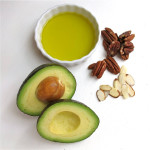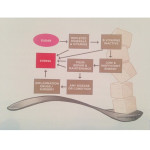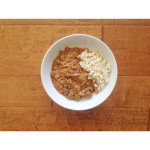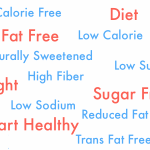When you are transitioning to a cleaner diet (and grocery list), this will most likely mean the former nutrient-empty junk you spent your hard earned money on will be replaced with good-for-you food that comes from good ol’ dirt, water + sunshine.
In regards to budget for the two of us (and our ill-mannered children), our food comes top priority after we’ve taken care of house payments + bills. Yes, it may be viewed as “expensive” on the front end, but we view it as an investment in our health.
Here’s the way I see it: you are either going to pay for it now in the form of wholesome nutrition + food, or you are going to pay for it later (and mostly likely pay more) in the form of medications + hospital bills. Think about it. It’s your choice!
When many people begin the quest to getting healthy, they think of that pesky dollar sign $$$ and how it is probably out of their budgets to eat clean, and simply can’t fathom that they have to buy organic EVERYTHING.
Well, I have some good news for you:
You do not have to buy organic everything. I REPEAT… you DO NOT have to buy organic everything!
If you are budget-conscious like many of us, but want to make small steps towards a cleaner diet, there are a couple of ways to make that happen without breaking the bank.
Have you heard of the “dirty dozen” and the “clean 15?” These are two lists of produce to help you determine whether or not it is safe to buy conventional produce or if you need to go for organic.

DIRTY DOZEN: Produce that has softer skin or that you will most likely eat the skin, definitely go organic. Pesticides and other harsh chemicals will seep through the skin and into the food, compromising it’s nutrients, and more importantly, your health.
CLEAN 15: If you are looking to save, it is OK to go conventional with these foods. They are either grown underground, have a tough outer layer that you won’t be eating, or have multiple layers that you can peel off to get to the goods.
If you don’t seem to eat through your produce quick enough before it starts to spoil, freeze it, buy less at one time, or opt for already frozen fruits + veggies! But read the label to make sure there isn’t anything that shouldn’t be in there! No added sweeteners, preservatives or other yucky chemicals you can’t pronounce. It should just be the food item, flash frozen in a package. (This is a really great option to stock up on goodies for smoothies and soups/crockpot meals!)
Want to know a fun trick for knowing how your produce was grown? You know that little bar code sticker on your apple? It’s called a product SKU number, which indicates how it was grown (and often has the geographical location printed on them too!)
Here’s how to read them:
- if it starts with 9 = organic — BEST!
- if it starts with 3 or 4 = conventionally grown — OK.
- if it starts with 8 = genetically modified (GMO) — AVOID!
You are probably asking….”what the heck is GMO, and does avoiding it really matter?” YES! stay tuned for a future post on this!
If you really care about knowing where your food comes from, I highly encourage you to support a local farmer. You will be eating local, seasonal fruits + veggies and helping out the local economy by investing in a family business.
This year, my husband and I joined a CSA (community shared agriculture) with Porter’s Farms right here in Midland. YES, A LOCAL, ORGANIC FARM IN MIDLAND TEXAS! Be sure to check out their facebook page for regular updates!

Since it’s only the two of us, we were split our share with some of our family. So, every week starting in May/June, we pick up a box full of fresh produce directly from Stephen. Several weekends of the year he will invite us out to the farm to pick our own goodies, if there is plenty for the taking. He even has fresh eggs available for purchase! $4 a dozen vs the almost $5 a dozen I’ve seen in local grocery stores.
I cannot tell you how excited I was when we first visited to pick our own veggies, feed the chickens + meet the adorable cows. If you don’t know by now, I secretly want to live on a farm…

You can tell that Stephen truly cares + takes pride in not only his farm, but also the health of his community. And after munching down on all of the carrots, kale, cantaloupe, zucchini + squash, I honestly wouldn’t want to buy my produce anywhere else!
I absolutely love the idea of supporting our local farmer, and I know I am going to get the freshest produce, perfectly picked at the right time, delivered by a hardworking, caring family. Plus, it’s kind of fun to see what ends up in your box each week, causing you to maybe try new-to-you veggies or recipes! This week I plan on cooking up the eggplant + okra we received in our box! be looking for recipes on those!
If you are interested in joining in on the Porter’s Farms CSA, I think they still have a few shares open, so contact Stephen to start feeding your family better today!
To find a local farmer’s market, farm or CSA in your area, visit www.localharvest.org.
Want to see the world get healthier like I do? View your grocery bill as a ballot. Every item you purchase is a vote towards keeping it on the shelves. Create the demand for good, wholesome, nutritious food, and the change will come. EVERY VOTE COUNTS!
live well. love well. be well.
/////////////
DISCLAIMER: Please note that I am not a licensed medical professional. Any and all nutrition + health advice given through this post series is just that: advice. I cannot speak to, treat or diagnose any illness or health issue. Should you have a medical condition, I encourage you to talk with your personal physician before taking any advice here. If you choose to do so, you will be taking responsibility for your own health + wellness.






Great post! I didn’t know about the sku numbers. Thanks for sharing!